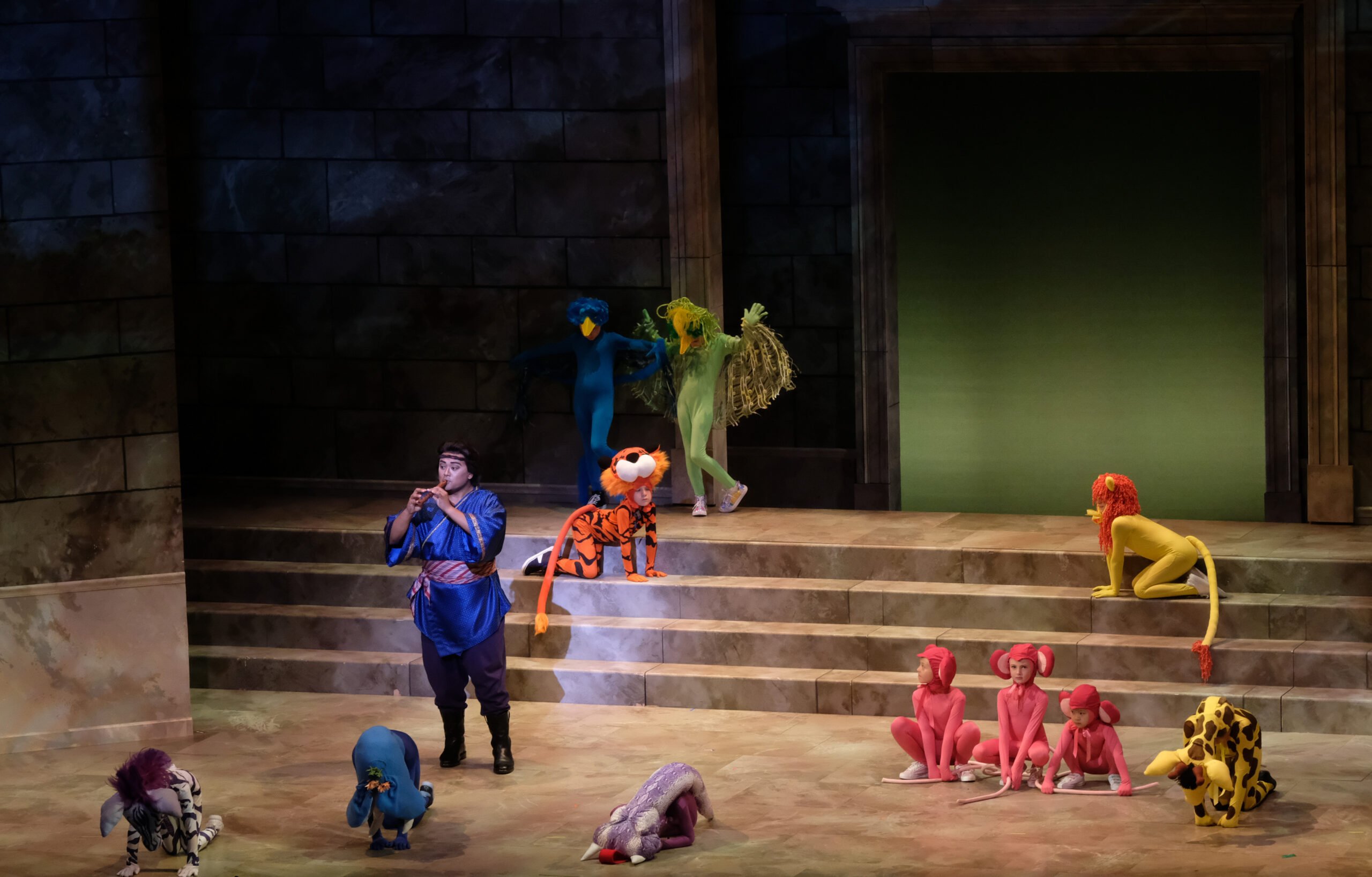The Magic Flute
ARTISTIC DIRECTOR DONA D. VAUGHN came onstage before the curtain rose on Opera Maine’s Magic Flute and thanked the audience for supporting what she called “the little opera company that could.” The Portland-based operation, celebrating its twenty-fifth anniversary this season, does a lot with a little every summer, and this year’s production, staged by Vaughn, was no exception (seen Jul. 26). With storybook costumes and set, it was traditional in the best way, honoring the source material while updating some of the theatrical details to make it feel more vibrant.
For example, in the first scene, the serpent chasing Tamino was here a horrific, kabuki-like puppet (designed by Figures of Speech Theatre)—which took a charming bow at the curtain call. The Three Ladies wore beaky black bird masks and feathered black dresses with glittery glam; the Queen of the Night had a similarly Tim Burton-esque costume (designed by Millie Hiibel), a black-and-midnight-blue gown covered in sparkling jewels, including a huge crown nestled in a mini-Marge Simpson wig. The Three Child Spirits glided in and out of their scenes on Heelys.
Erhard Rohm’s unit set established the fantasy setting—stony, imposing and well-appointed—while Alex Basco Koch’s projections could change it from a dungeon to a palace. Kate Ashton’s lighting was simple and effective, shifting the mood of the piece from brooding to playful as the music demanded.
The production’s biggest problem was its spoken dialogue, in English, which all of the actors struggled with; it never felt natural, just declaimed to the back row, so the many jokes repeatedly failed to land. Most of the cast excelled at expressing emotion while singing but seemed at a loss when the music stopped; one yearned for a bit less spiel and a lot more sing from this singspiel.
Geoffrey Agpalo, as Tamino, was the night’s brightest star. His smooth and heartfelt tenor traced a nice-’n-easy line with clean tone, matching the beauty of the music with the beauty of his singing. The sound was huge, open and bright, as satisfying as the sunny and breezy Maine summer weather. His Pamina, Brandie Sutton, struggled with her lower range but showcased a full and open top. Wispy but pretty, her “Ach ich fühl’s” was full of aching longing.
Robert Mellon, as Papageno, was more impressive in his singing than his comedy. His “Ein Mädchen” was colorful, vibrant and confident, while in “Papagena! Weibchen, Täubchen” his mahogany baritone was alternately ardent and antic. Yeonji Lee, as Papagena, humorously and effectively evoked the old crone.
Kathryn Bowden, as Queen of the Night, made “O zittre nicht” a melancholic delight, with rich legato and sweet-and-solid tone from top to bottom; in “Der Hölle Rache,” she showed elegance and facility, effortlessly dispatching the impossible coloratura fireworks, though she lacked some undergirding heft, sacrificing some of the drama. Still, her sheer technical ability deservedly brought down the Merrill Auditorium.
Hidenori Inoue, as Sarastro, struggled with pitch, tempo, the German text and the English dialogue. Lucas Levy, as Monastatos, costumed like an extra from Aladdin, was appropriately scuzzy in behavior while vocally forward and strong. Maureen Brabec, Anna Mandina and Kristen Choi sang with Rhinemaidenly harmony and grace as the Three Ladies.
The Chorus, prepared by Sarah Bailey, showed power and finesse, soaring gloriously, particularly in the pagan chorales. The orchestra sounded just as beautifully blended. Led by Roberto Kalb, who stepped in on short notice, they infused each beat with well-sensed feeling that poured over into the next, maintaining unflagging momentum from the tight and lively overture, here with a proto-Beethoven quality in the dynamics and attack, to the very end. —Henry Stewart

